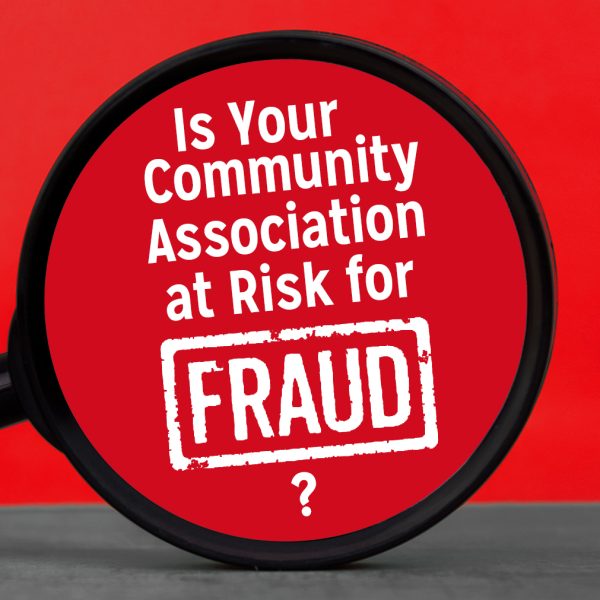Condominium, homeowner (HOA), and townhome community associations are not immune from fraud. Recently in the news, multiple members of a homeowner’s association were arrested for suspected theft, money-laundering, and other charges. Investigators believe millions of dollars were stolen from the community’s budget through questionable expenses, personal purchases, and diversion of association funds.
Associations members can protect their community from financial mismanagement and potential fraud by recognizing warning signs and being prepared to take appropriate action.
Association Budgets and Fraud
Community associations utilize budgets to outline the projected income and expenses for the association for a given period of time, usually for one year. The budget is typically developed by the association’s board of directors and is used to plan for the community’s financial needs and to ensure that it has sufficient funds to cover expenses.
The budget may include a variety of different items, such as maintenance and repair costs, insurance premiums, and fees for professional services (ex. accounting, legal, management). It’s important for the association to carefully manage its budget to maintain the community’s property values and to provide necessary services to its members.
However, association members should be aware of potential fraud including inconsistencies in the association’s budget, unpaid bills, conflicting vendor payments, embezzlement of funds, bribery, and other forms of financial misconduct.
Potential Fraud Red Flags
There are several ways that an association may be at risk for fraud, including:
- Lack of financial oversight: If a community association does not have adequate checks and balances in place to monitor its financial activities, it may be more vulnerable to fraud.
- Insufficient training: If board members and other individuals involved in managing the association’s finances are not trained in financial management and fraud prevention, they may be more likely to make mistakes or to fall victim to fraudulent activities.
- Misuse of funds: This may involve using HOA funds for unauthorized purposes, such as personal expenses or investments.
- Financial mismanagement: If the association does not have strong internal controls, such as policies and procedures for handling financial transactions and maintaining financial records, it may be more susceptible to fraud.
- Embezzlement: This occurs when an individual steals money from the association’s accounts or misuses funds for their own personal gain.
- Bribery: This involves offering or accepting payments or other benefits in exchange for favorable treatment or actions within the HOA.
- Conflict of interest: If a board member or other individual involved in managing the association’s finances has a personal interest in a transaction, it may increase the risk of fraud. For example, kickbacks involve an individual receiving a payment or other benefit in exchange for steering association business to a particular vendor or contractor.
- Lack of transparency: If an HOA does not provide its members with clear and transparent information about its financial activities, it may be more difficult for members to detect and prevent fraud.
Fraud can have serious consequences for both individual owners and the community as a whole. It’s critical for association board members to implement strong financial management practices and to regularly monitor and review the community’s financial activities to prevent and detect fraud.
Addressing Potential Fraud in the Community
If members suspect that fraud is occurring within the association, there are several steps that it can take to address the situation. Some possible actions include:
- Conduct an internal investigation: The association’s board of directors can conduct an internal investigation to gather information and evidence about the suspected fraud.
- Consult with legal counsel: It is important for board member and/or management to consult with an attorney who is knowledgeable about community association law and fraud issues to understand legal options and obligations.
- Report the fraud to law enforcement: Depending on the nature and severity of the fraud, the association may need to report the situation to the appropriate law enforcement agencies.
- Implement preventive measures: Once the fraud has been addressed, the association can take steps to prevent similar incidents from occurring in the future. This may include implementing stronger internal controls and financial management practices, providing training to board members and other individuals involved in handling community finances, and increasing transparency and communication with association members.
Overall, it is important for the association to take decisive action in response to suspected fraud to protect the community’s finances and reputation.
Legal Resource
Do not hesitate to contact our law firm if your condominium, homeowner (HOA), and townhome community associations has any legal concerns.
Please call 855-537-0500 or visit www.ksnlaw.com.
Please note the material contained in this article is for educational and informational purposes only and does not constitute legal advice. No attorney-client relationship is established by your review or receipt of the information contained in this article. You should not act on the information discussed in this article without first obtaining legal advice from an attorney duly licensed to practice law in your State. While KSN has made every effort to include up-to-date information in this article, the law can change quickly. Accordingly, please understand that information discussed in this article may not yet reflect the most recent legal developments. Material is not guaranteed to be correct, complete, or up to date. KSN reserves the right to revise or update the information and statements of law discussed in the article law at any time, without notice, and disclaims any liability for your use of information or statements of law discussed on the article, or the accessibility of the article generally. This article may be considered advertising in some jurisdictions under applicable law/s and/or ethical rules/regulations. © 2023 Kovitz Shifrin Nesbit, A Professional Corporation.

